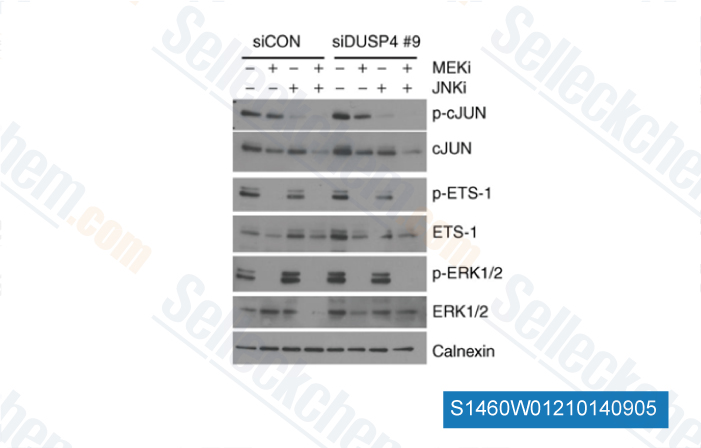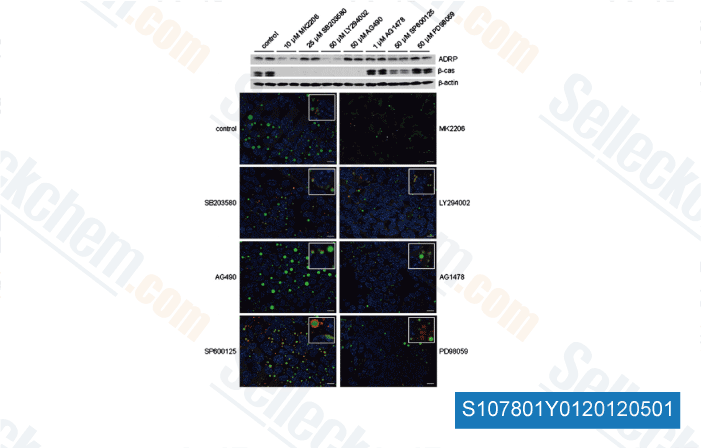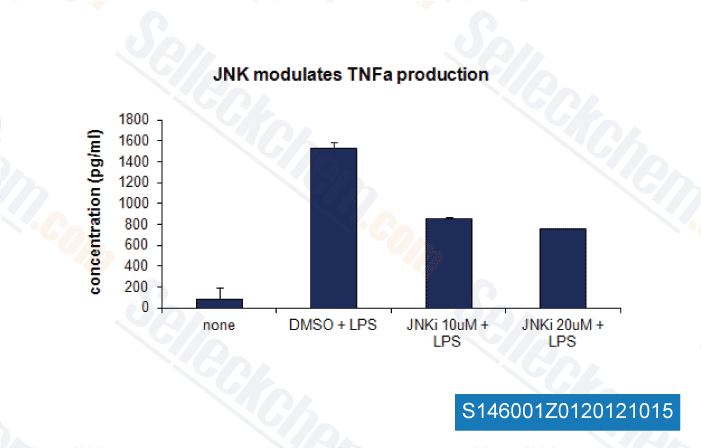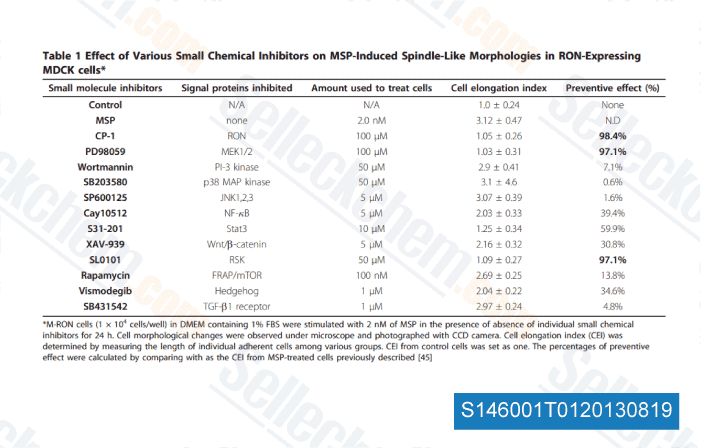|
Toll Free: (877) 796-6397 -- USA and Canada only -- |
Fax: +1-832-582-8590 Orders: +1-832-582-8158 |
Tech Support: +1-832-582-8158 Ext:3 Please provide your Order Number in the email. |
Technical Data
| Formula | C14H8N2O |
|||
| Molecular Weight | 220.23 | CAS No. | 129-56-6 | |
| Solubility (25°C)* | In vitro | DMSO | 44 mg/mL (199.79 mM) | |
| Water | Insoluble | |||
| Ethanol | Insoluble | |||
|
* <1 mg/ml means slightly soluble or insoluble. * Please note that Selleck tests the solubility of all compounds in-house, and the actual solubility may differ slightly from published values. This is normal and is due to slight batch-to-batch variations. * Room temperature shipping (Stability testing shows this product can be shipped without any cooling measures.) |
||||
Preparing Stock Solutions
Biological Activity
| Description | SP600125 (Nsc75890) is a broad-spectrum JNK inhibitor for JNK1, JNK2 and JNK3 with IC50 of 40 nM, 40 nM and 90 nM in cell-free assays, respectively; 10-fold greater selectivity against MKK4, 25-fold greater selectivity against MKK3, MKK6, PKB, and PKCα, and 100-fold selectivity against ERK2, p38, Chk1, EGFR etc. SP600125 is also a broad‐spectrum inhibitor of serine/threonine kinases including Aurora kinase A,FLT3 and TRKA with of IC50 of 60 nM, 90 nM and 70 nM. SP600125 inhibits autophagy and activates apoptosis. | |||||||||||
|---|---|---|---|---|---|---|---|---|---|---|---|---|
| Targets |
|
|||||||||||
| In vitro | SP600125 is originally characterized as a selective ATP-competitive inhibitor of c-Jun N-terminal kinase JNK. In Jurkat T cells, SP600125 inhibits the phosphorylation of c-Jun with IC50 of 5 μM to 10 μM. In CD4+ cells, such as Th0 cells isolated from either human cord or peripheral blood, SP600125 blocks cell activation and differentiation and inhibits the expression of inflammatory genes COX-2, IL-2, IL-10, IFN-γ, and TNF-α, with IC50 of 5 μM to 12 μM. [1] However, later studies reveal that SP600125 also suppresses aryl hydrocarbon receptor (AhR) [2], Mps1 [3], and a panel of other serine/threonine kinases, including Aurora kinase A, FLT3, MELK, and TRKA [4]. In a mouse beta cells MIN6, SP600125 (20 μM) induces the phosphorylation of p38 MAPK and its downstream CREB-dependent promoter activation. [5] In HCT116 cells, SP600125 (20 μM) blocks the G2 phase to mitosis transition and induces endoreplication. This ability of SP600125 is independent of JNK inhibition, but due to its inhibition of CDK1-cyclin B activation upstream of Aurora A and Polo-like kinase 1. [6] |
|||||||||||
| In vivo | In mice, SP600125 (15 mg/kg or 30 mg/kg) significantly inhibits lipopolysaccharide (LPS)-induced TNF-α expression and anti-CD3-induced apoptosis of CD4+ CD8+ thymocytes. [1] |
Protocol (from reference)
| Kinase Assay: |
|
|---|---|
| Cell Assay: |
|
| Animal Study: |
|
References
Customer Product Validation

-
Data from [Cancer Res, 2013, 73(20):6346-58]

-
Data from [Biochim Biophys Acta, 2012, 1823(5), 987-96]

-
, , Lee lay hoon from National University of Singapore

-
,
Selleck's SP600125 has been cited by 1193 publications
| Pharmacogenomic profiling of intra-tumor heterogeneity using a large organoid biobank of liver cancer [ Cancer Cell, 2024, 42(4):535-551.e8] | PubMed: 38593780 |
| Cancer cell genetics shaping of the tumor microenvironment reveals myeloid cell-centric exploitable vulnerabilities in hepatocellular carcinoma [ Nat Commun, 2024, 15(1):2581] | PubMed: 38519484 |
| Phosphorylation of human glioma-associated oncogene 1 on Ser937 regulates Sonic Hedgehog signaling in medulloblastoma [ Nat Commun, 2024, 15(1):987] | PubMed: 38307877 |
| Cell mechanics regulate the migration and invasion of hepatocellular carcinoma cells via JNK signaling [ Acta Biomater, 2024, S1742-7061(24)00036-9] | PubMed: 38272199 |
| Palmitate induces integrated stress response and lipoapoptosis in trophoblasts [ Cell Death Dis, 2024, 15(1):31] | PubMed: 38212315 |
| Bactericidal/permeability-increasing protein instructs dendritic cells to elicit Th22 cell response [ Cell Rep, 2024, 43(3):113929] | PubMed: 38457343 |
| JNK signaling mediates acute rejection via activating autophagy of CD8+ T cells after liver transplantation in rats [ Front Immunol, 2024, 15:1359859] | PubMed: 38562941 |
| Cholesterol trafficking to the ER leads to activation of CaMKII/JNK/NLRP3 and promotes atherosclerosis [ J Lipid Res, 2024, S0022-2275(24)00039-7] | PubMed: 38522750 |
| Ammonia stress-induced heat shock factor 1 enhances white spot syndrome virus infection by targeting the interferon-like system in shrimp [ mBio, 2024, e0313623.] | PubMed: 38358252 |
| Securinine inhibits the tumor growth of human bladder cancer cells by suppressing Wnt/β-catenin signaling pathway and activating p38 and JNK signaling pathways [ Biochem Pharmacol, 2024, 223:116125] | PubMed: 38484850 |
RETURN POLICY
Selleck Chemical’s Unconditional Return Policy ensures a smooth online shopping experience for our customers. If you are in any way unsatisfied with your purchase, you may return any item(s) within 7 days of receiving it. In the event of product quality issues, either protocol related or product related problems, you may return any item(s) within 365 days from the original purchase date. Please follow the instructions below when returning products.
SHIPPING AND STORAGE
Selleck products are transported at room temperature. If you receive the product at room temperature, please rest assured, the Selleck Quality Inspection Department has conducted experiments to verify that the normal temperature placement of one month will not affect the biological activity of powder products. After collecting, please store the product according to the requirements described in the datasheet. Most Selleck products are stable under the recommended conditions.
NOT FOR HUMAN, VETERINARY DIAGNOSTIC OR THERAPEUTIC USE.
